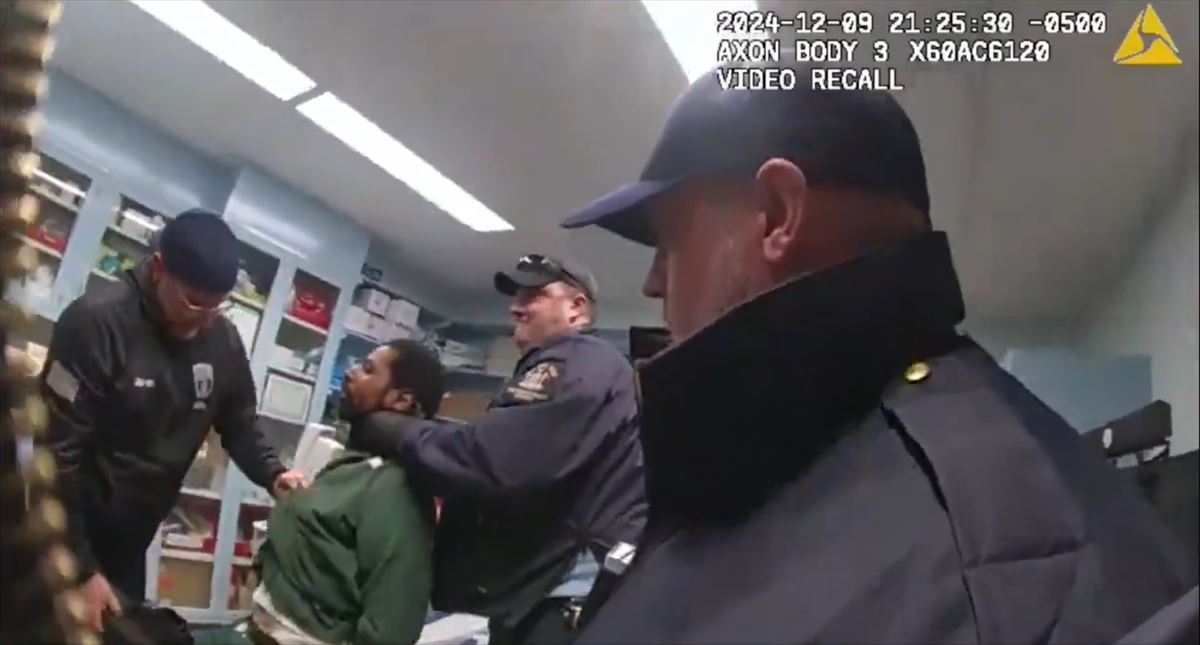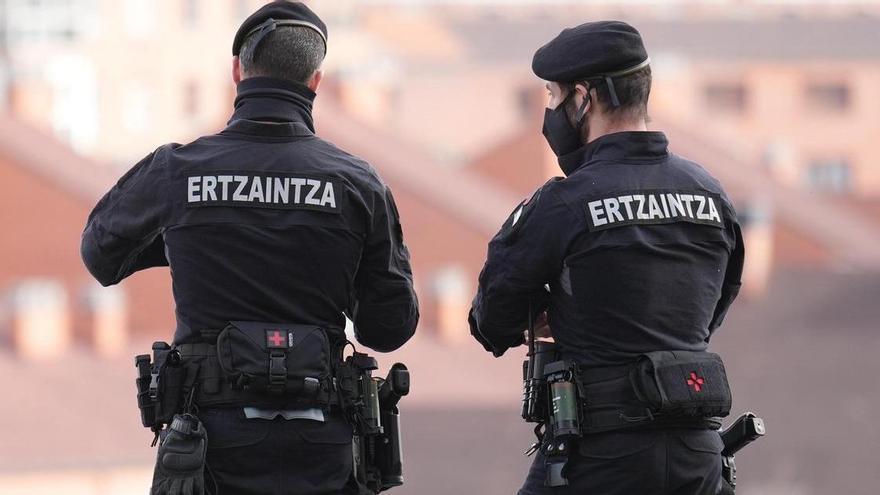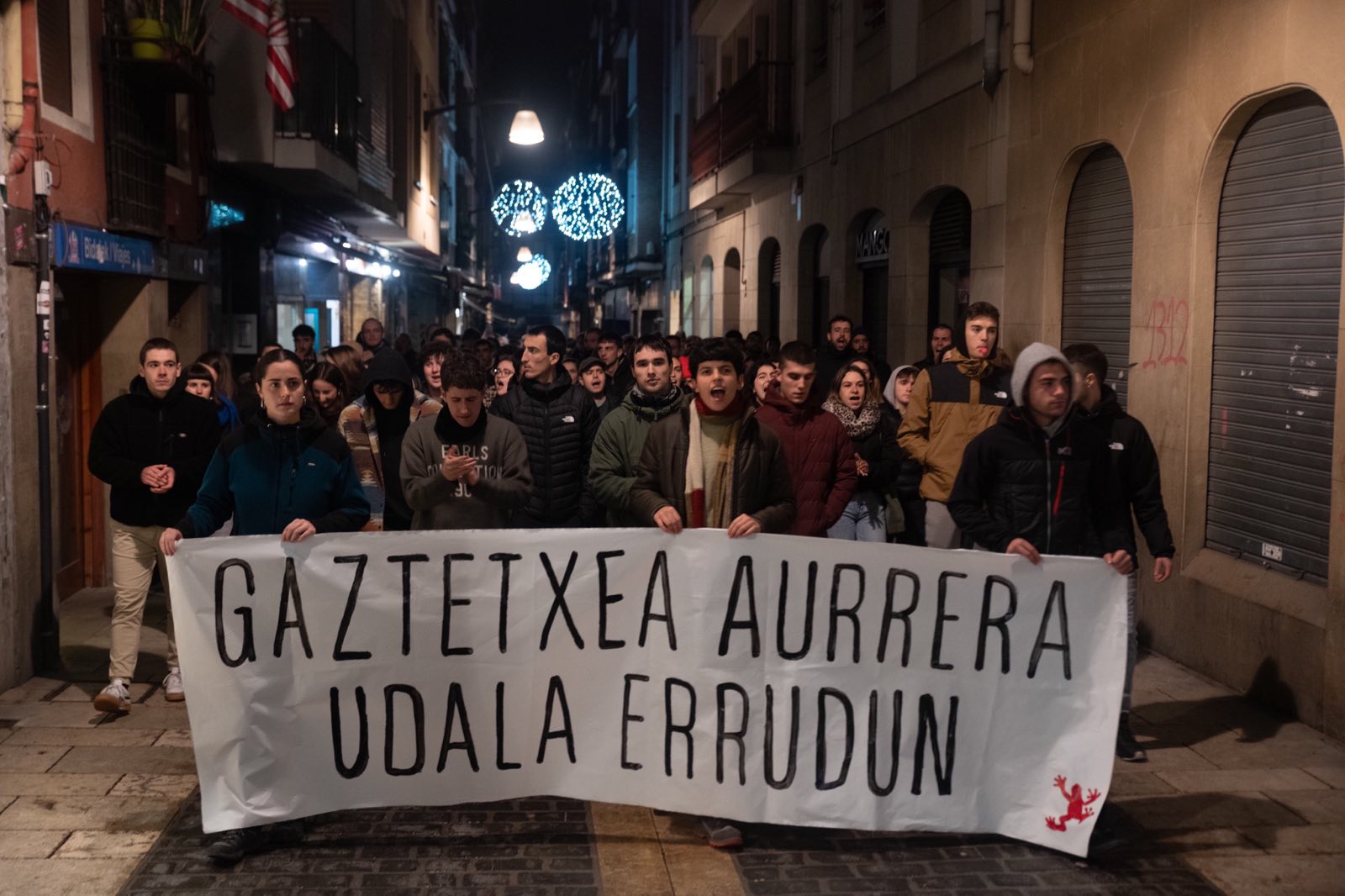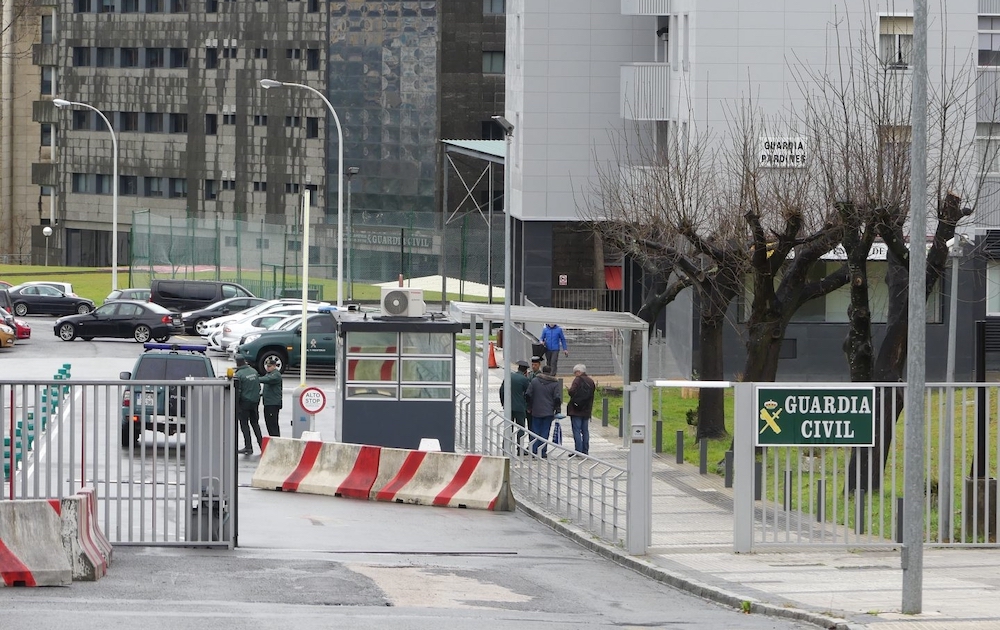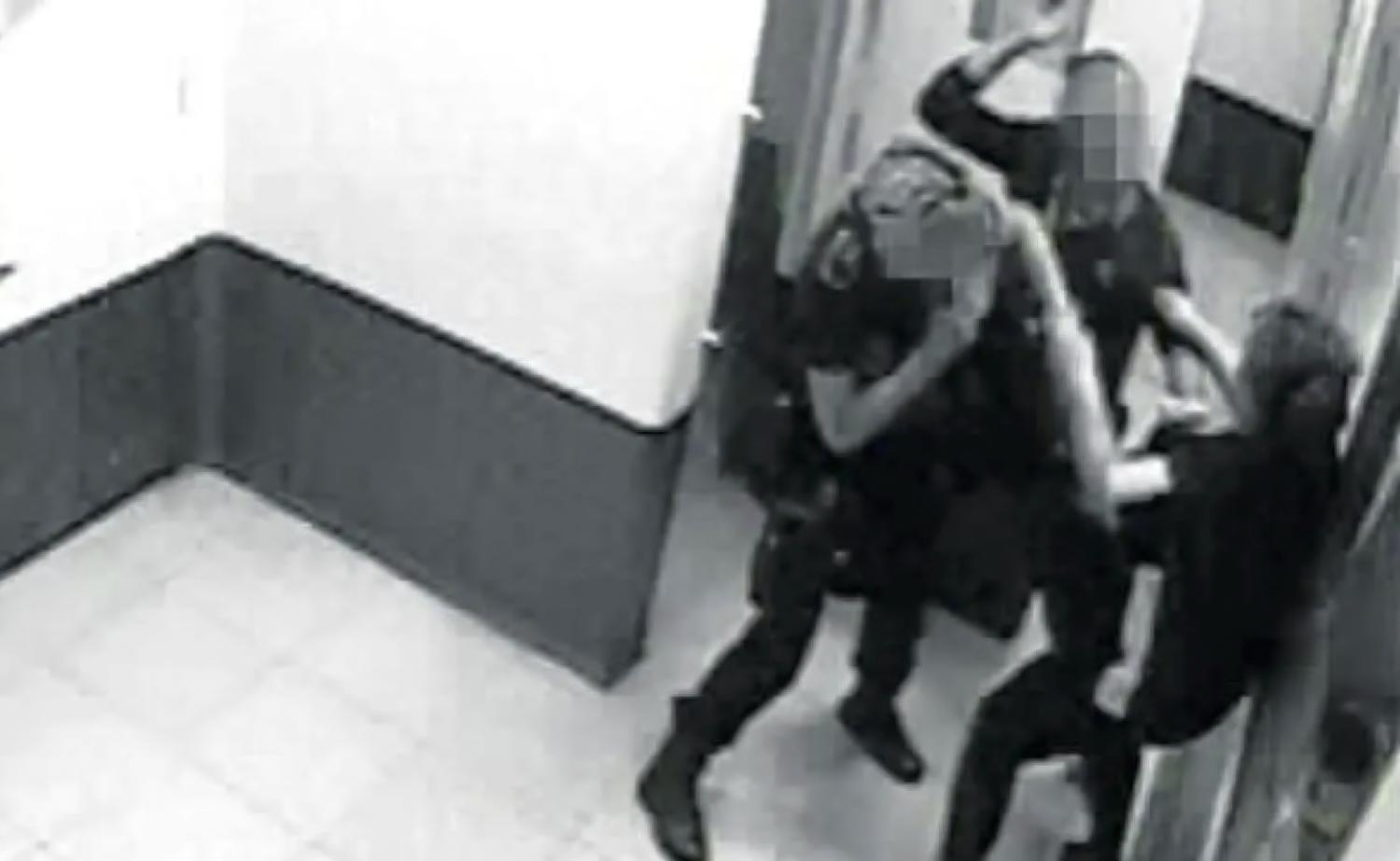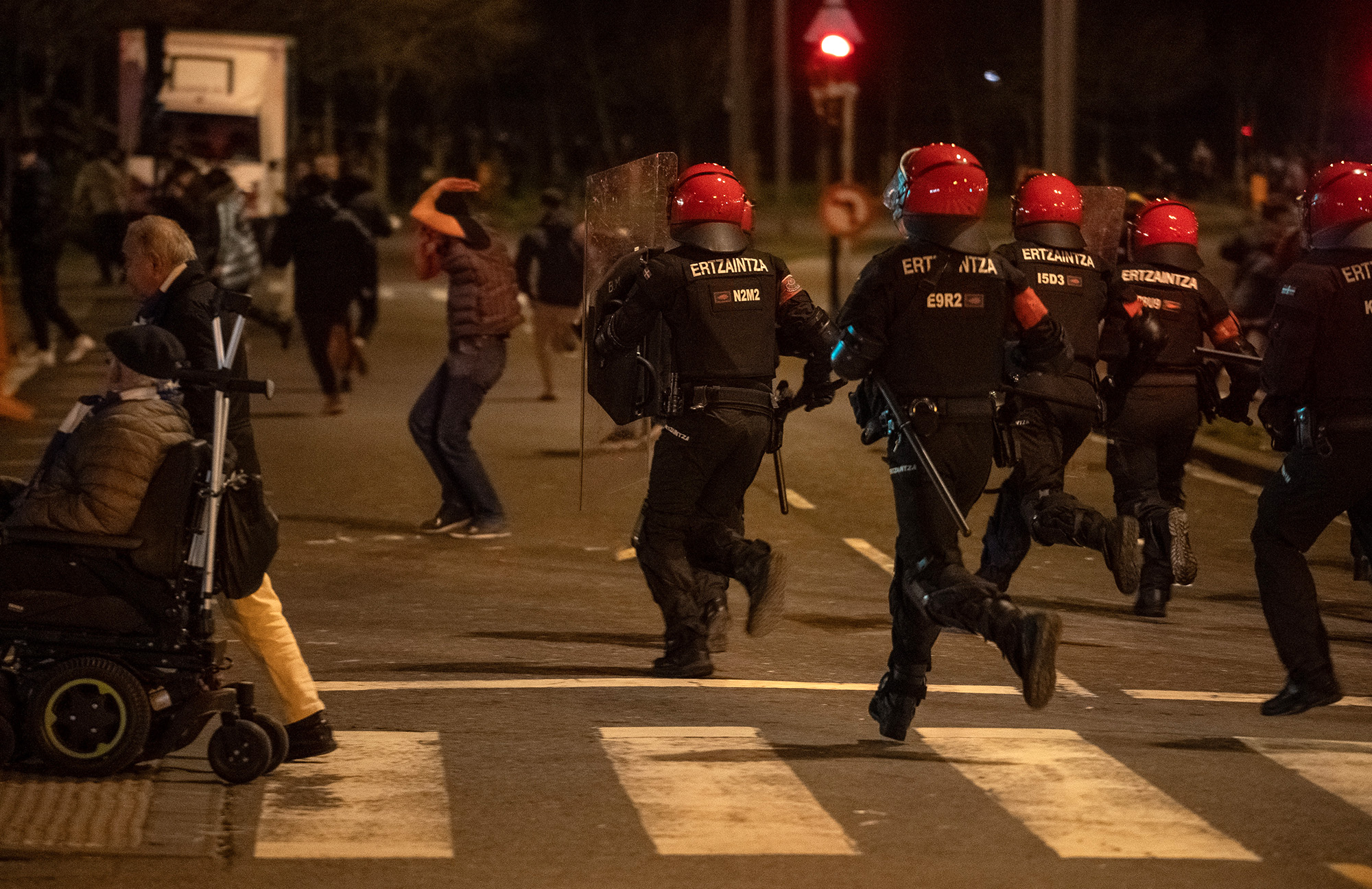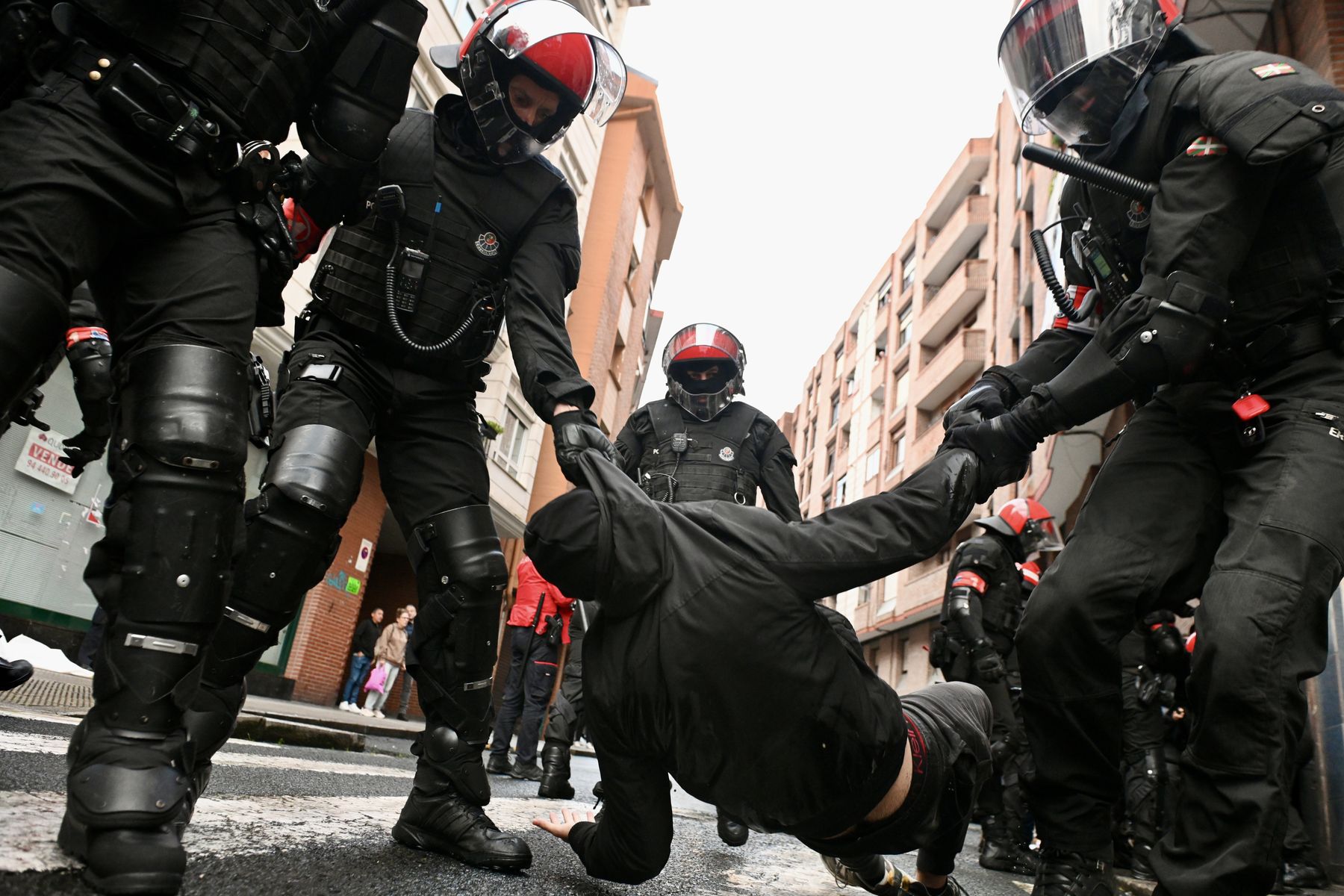False truths of the mayor of Bilbao (or why the police?)
- To address what is called the police issue, there are often rude polemics among those who have different positions: those who advocate that there be more police on our streets, those who call for an irreversible reform of existing police models, or simply advocate abolition. These great debates are certainly necessary, but they should not confuse our eyes. For in the meantime and in our daily lives, without great arguments or arguments, the public authorities wanted us to impose absolute false truths: the only way to combat crime is the presence and firmness of the police, which guarantees our security. To let these messages go unchallenged is to make it easier for them to stand in the collective imaginary as irrefutable truths. And all too often we fall into that mistake. Let's look at it with just one example. This has been made available to us by the mayor of Bilbao last Big Week. And then let's look at whether it's possible to face conflicts without going to the police.

Borto's false truths about security in the txosnas and police
Bored said in public statements that the representatives of the comparsas, before Big Week, “held a meeting with the Municipal Guard and asked us less Police, it seems they do not like it. But the citizens ask us for more police, and I will not listen to the comparisons, I will listen to the citizens. I’m responsible for safety and I’m not going to talk about safety with comparsas.” We don't know who Aburto calls, it seems that he at least excludes comparisons. But, first of all, let us clarify that Aburto’s attitude, as well as presagiarism, seems to us to be of poor education: he meets with representatives of the comparison group (that is, they launched the heart of the popular festivities in Bilbao in auzolan and accumulate 45 years of organisational experience, therefore, they will know something) and tells them that what they have to say about the security of the parties is what you say and do. That's very poor.
But Aburto knows a lot more about the issue, which on this occasion he has silenced or misrepresented, because it suits him. First of all, Bilbao is an undangerous city. Because, although we do not agree that the security of people and peoples is measured in parameters of police and crime, the data confirm that Bilbao is a safe city. According to the website of the Basque Government in March 2022, the analysis of crimes committed jointly by the Ertzaintza and the Municipal Police of Bilbao, "Bilbao has consolidated in 2021 among the three safest cities in the state (...) is the safest if we look at the most serious crimes and those that cause the greatest social alarm". Furthermore, Bizkaia Talent recently received that "Bilbao is the fourth most secure city on the planet, according to the World’s Best Cities 2023. This ranking brings together the 100 best cities in the world to live, work, invest and visit." Boring knows everything. Moreover, when he has agreed to it he has called for this data, as when at the end of 2019 the data confirm that Bilbao is the safest city in the state.
According to the analysis of the crimes committed jointly by the Ertzaintza and the Municipal Police of Bilbao, "Bilbao is consolidated in 2021 as one of the three safest cities in the state"
Faced with this striking contradiction between what the citizens believe and what the data reflect, any political party should base its efforts on pedagogical work: first to know the causes of this contradiction and, second, to end it, because it is the best way to eliminate the perception of unfounded insecurity. If Aburto had acted responsibly, he would learn that, according to academic experts in the field (in this case, Caty Vidales Rodríguez, professor of Criminal Law), there is a "great consensus" when pointing out that "the media has a significant impact on the genesis of anguish." In fact, the continued account of criminal acts, sometimes partially and distorted, decisively feeds the belief that insecurity is now greater than when information about them did not have the undeniable prominence it has today”. The same expert believes that the irresponsible conduct of many institutional leaders has even more worrying consequences: "It leads to a greater demand for social security, which is sometimes manifested in inadequate or at least dubious political-criminal decisions." That's why he says "the key is not to increase police presence." But the mayor of Bilbao, as we shall see, has done quite the opposite.
Aburto first achieved the mayor of Bilbao in 2015, and although he acknowledged that it is a safe city, between 2016 and 2023 the number of local police officers increased by 25.39%. This increase has increased further during the Big Week, which has tripled the presence of local police, from 300 to 800 police. Let the comparisons ask for less police presence so that it is not understood!
Aburto has increased the number of agents by 25.39% between 2016 and 2023. This increase has increased in the Big Week: 300 police to 800
Police presence increased especially in 2019: 90% more police than in 2017 and 20% more than in 2018. Interestingly, and once again making it clear that the increase in the police presence does not necessarily mean a reduction in crime, in 2019 25.2% more crimes were counted than in 2017 and 28.3% more than in 2018. In view of the behavior of the Municipal Police of Bilbao, it is worth reflecting on whether the increase in the number of holiday crimes is not precisely the cause of its greater presence.
In any case, Aburto has shown satisfaction in the 2023 Big Week safety assessment. Reason your joy: "The number of arrests is being very important (...) It's more than ever, that's the figure, 30 percent more than the previous year" (...) Sometimes blinds have been full." The fact is that in the same year that this dramatic increase in arrests took place (2023), the number of complaints for crimes committed has decreased by 17 per cent. And this leads to a reasonable new doubt: Are they arresting more innocent people using the race or origin of citizens? It's not a malicious question, because some elements suggest it.
Are they arresting more innocent people using the race or origin of citizens? Some elements suggest this.
Consequences not mentioned by Aburto in citizenship
On the one hand, the use of so-called racial profiles is an endemic problem, as concluded during the 2018 visit to Spain of the Committee of Experts on African Successions. That same year, the European Commission to Combat Racism and Intolerance was firmly convinced that "racial discrimination by law enforcement" is a permanent problem. A new example was the one we had last June when it was discovered that a head of the Spanish police station in Irún was rewarded by the police based on the number of migrants detained. The Municipal Police of Bilbao does not seem to escape this trend, as the comparisons themselves have denounced police violence against mantars this year. SOS Racism Bizkaia has repeatedly denounced the racist violence of the Municipal Guard. Last July he sent a public letter to Aburto, along with eight other institutions, requesting the cessation of the Security Council and the end of racist abuses by the police.
On the other hand, Aburto stands out for being one of those who relate the effectiveness of the Police to the number of arrests ("Police effectiveness is increasing considerably, resulting in more arrests than ever," he said in previous celebrations). However, countless studies and experts warn of this serious practice. For example, Human Rights Watch: "The massive use of detention police powers, for example, can only be justified by the need to ‘do statistics’, which demonstrate the effectiveness of the policy with the simple argument of the number of arrests, and by the authoritarian time-detained practice instead of investigating detention. The production of crimes goes in parallel to improve the image of the police station that has intervened selling news to the press.” In a closer environment, Caty Vidales himself, director of the Center for Prevention and Safety Studies at Jaume I University, highlights: "As far as accountability is concerned, it is a major obstacle to measuring productivity and, therefore, the work of the police based on results, and not on the implementation of effective preventive measures or a responsible service".
But it is not only reasoned citizens who suffer the consequences of criminal profiles. Both in identification and in detention, "young men and people belonging to ethnic or religious minorities" also suffer, José María López-Riba, Doctor of Law and Professor of Criminology. Available data, as reflected in the text limitations and limitations. In addition, he complains painfully about the lack of data, especially in some cases: "The most important limit is the lack of data from local police in general and from regional police, such as the Ertzaintza or the General Police of the Canary Islands." López Riba adds another important issue that hides us: "the type of detention that has been carried out (pre-trial or procedural) does not appear in the official data, nor does it specify how many of the detainees have been convicted in the end." But it is a fundamental fact, because the many arrests made by Aburto police during Big Week have not served to stop the criminals, but to increase the numbers of Aburto... and to crush the parties to the innocent people detained.
"Despite the many studies carried out, no relationship could be found between the number of police officers and the crime rate" (David H. Bayley)
As a result, a large part of the population is insecure during the festivities when they see the major police operators. The same is true when the official announces that arrests will increase in order to justify the commitment to insecurity previously shaken by security officials and their police officers. But in addition, and as stated by Caty Vidales de Rico and Salas 1, for the rest of the population "the increase in repression will not necessarily eliminate or reduce citizens' sense of fear of crime, but can increase if citizens think that greater repressive activity is related to a more serious criminal reality". David H. The well-known expert Bayley adds that "despite the many studies carried out, it has not been possible to find a relationship between the number of police officers and the crime rate. Moreover, it has been shown that the main strategies of the modern police have little or nothing to do with crime." In fact, one of the key keys was that Diego Torrente Robles, an expert in police affairs, spent a few years: "The objective of significantly eliminating or reducing crime runs counter to the real possibilities of the police. Controlling the factors that cause it is not in your hands."
One of the keys to addressing the factors that force crime to survive is a growing gap between those who accumulate economic wealth and those who do not have income for a dignified life. According to a report by the City Council, "the proportion of people in real poverty in Bilbao is 10.1%, and is steadily increasing since 2008". Among the ways of dealing with this very serious issue, one of them would be more budgetary than the so-called Social Work. However, the municipal social action budget of 2023 (57,331,600 euros) is 37.1% lower than the Citizen Security budget (91,127,000 euros) and, since its arrival at the mayor of Aburto, while the Citizen Security budget has increased by almost 22 million euros, the social action budget by less than 14 million. However, the base salary of a Local Police officer in Bilbao in 2020 was EUR 41,000 (to which must be added productivity, overtime, shifts...), while the inter-professional minimum wage in that same year was EUR 13,300.
"Since Aburto's arrival at the mayor, while the Homeland Security budget has increased by almost 22 million euros, the Social Action budget has increased by less than 14 million"
Probably, if instead of increasing the number of local policemen, tax fraud or that of workers seeking white-collar crime increased, Aburto would have more resources to alleviate the impoverishment of the bilbaits, and would certainly reduce the number of those who have to survive in some way. It's not a radical idea. David Martín, inspector of the Municipal Guard of Fuenlabrada says: "The model focuses on the prosecution of crime, based on the work of preventive patrol and terror, the basic premise is erroneous (...) most of the criminal field is anti-patrimonial (we do not go deeper to see where the social problems are)." He also says that "hiring professionals from these areas would be a big investment. And existing ones, they're not available 24 hours a day. Who's 24/7? Police."
Boring should keep this in mind if you want to understand and solve deep problems of real security. And to achieve this, in most cases, the police is not an advantage, but a serious obstacle.
Real Security without Police
So far we have not wanted to give our opinion, we have used the voices of experts who will not condemn Aburto for his academic and ideological profile. Let's see if through these readings he is able to understand that his police vision of Big Week's security doesn't help solve problems, and instead accentuates them.
But now, thinking of the rest of the people who are reading this text, we would like to point out some views, practices and materials that citizens can use to boost the guarantee of our (and the real) security. This very idea, of course, scares and enrages the police and their unions.
We had an example last year, also in the context of Aste Nagusia in Bilbao, when the comparsas presented their own protocol of care for victims of sexual assault. The ERNE union reacted with anger and described as "absurd" the existence of "txosnas, comparsas or party commissions that take responsibility for attending and assisting crime victims". The Secretary-General of the union expressed with rage: "It's a school that's passed from the courts to the police," he added two more pearls. "We have to be everywhere, because we just had to go back to the times to say that the police provoked it," and "[the promoters of these protocols] what they want is that there be no Police and that they walk to their liking in the festive enclosure, with their own rules." That is precisely where the lame can be.
"What if, despite the fact that the police is the key to the capitalist system, or indeed for that reason, those of us who want to transform society thought about how to end the police apparatus? "
And even though we know that the police is the key to the capitalist system, or indeed, if those of us who want to transform society think about how to end the police apparatus? What if, as in other cases, we wanted to dismantle the apparatus without waiting to day E for a classic revolution, without using the police in an easy way? It seems utopian, but some people tell us the experience that this option is more real than we might think at first.
Because theoretical abolitionist approaches have always existed since the birth of the police apparatus, but it may be necessary to collect concrete experiences that show how you can live without the police. In recent times, hopeful steps are being taken in this direction, and to conclude this text we would like to offer some clarifications for those who want to delve into this idea.
First of all, several Spanish texts have recently been published questioning the police. For example: End of police control, police. Critical analysis; Maderos, chusma and social order; Gassing, mutilating, orain. Armak ez letalak, edo Zer egiten du poliziak eta nola bizi gabe.
But we have said that we want to collect experiences, and for that, a lot of experiences in Mexico can be useful, among which are: Rounds of Cherán; Zapatista community justice; Urban experience in Acapatzin in Mexico; Community Police of the Costa Monte de Guerrero; or the Indigenous People's Council "Ricardo Flores Magón" of Oaxaca. There are also important experiences in other areas of Latin America, such as the peasant rounds in northern Peru or the Indigenous Guard of the Cauca peoples in Colombia. Some of these experiences have been published on paper, such as Wall Security; Peoples in defense of life and territory or Self-defense and community policemen. In the United States, the struggles of the Black Lives Matter have been driven, or there is experience of the Sioux people in the Standing Rock indigenous reserve.
Jumping to other continents is interesting How to abolish the police: Learn what the Lessons from Rojava text tells us. Also the experiences of the South African street commissions, based in the 1980s, the Citizen Defense Commissions organized by the Irish Republican Army (IRA) in Northern Ireland in the 1970s (the last two analysed by What the police do and how to live without it already cited).
In the context of the Spanish State, in addition to the references or interviews made to the authors of the aforementioned books, there are few articles of interest recently appeared. Examples include:
Poliziak herri-seguridad tasun handia da.
‘Defund the Police’: USA in the US US poliziaren final and radical public security:
Police growth reform? Defund the Police
Dreaming eta mundua polizi gabe;
Security problems in Basque Country?
Mundu bat possible da polizi gabe?
Let us also say that the author of the last article, Pastora Filigrana, has written a book, The Roma People Against the World System, in which he describes Community forms of conflict resolution, based on trust in referents of age, behavior or values. We also have the experience of AAMAS (Assemblea d 'Affecdades pel Masclisme i el Patriarcat), which provides support and support for the Machistas violence, and A l' aguait, which develops other ways of thinking and making security in Manresa.
We in the Basque Country have also begun to take some steps. A few months ago, the Txago initiative was presented as an instrument to document police violence, and the tools that the feminist movement has self-organized to deal with cases or risks of male violence are diverse. But there are still many steps to be taken. However, there are tools and initiatives that can open the door.
In Basque Country, there are still many steps to be taken. However, there are tools and initiatives that can open the doors for us.
Last October, the training axes of the Foundation of the Commons of the Spanish State are Police vs. Politics. From the politicization of the social to policies of trust. It was conducted in six sessions: 1) Metropolice: Security and police in the neoliberal city; 2) School and social services: when the panoptician delivers the social; 3) Neighborhood: Social policies vs trust policies; 4) The malots: 5) Who is the street? (6) Abolish the police: Definanciatzen et alternatiba depolicituosfor conflicts. These sessions were accompanied by a series of videos and introductory conferences.
But the best of all of this is that a wonderful initiative came out of the course that called Sin Pol. "What we can best manage many of the conflicts and violence we suffer and generate is a way to explore and demonstrate that we are often ourselves. Our main objective and political desire would therefore be to make it clear that the motto ‘my friends take care of me and not the police’ materializes in daily life much more than we know and think.” To do so, they want to gather experiences in which, faced with different types of conflicts, people, groups or communities decide to act without resorting to the police to solve them. The invitation sent to us by Sin Poli is the most complete way to close this text: “If you also believe that we have more capacity than we believe to assume responsibility for conflicts without resorting to the police, we invite you to help spread this message.”
Jar gaitezen 2025erako proposamen politiko gisa, Espainiako Auzitegi Kolonialaren (AN) epai guztiak berrikusten hasteko eta makila bakoitzak bere belari eusteko.
Unionismoarekin lerrokatutako alderdi, sindikatu eta gizarte-erakunde gehienek, eta ez bakarrik horrela... [+]
This year marks the 51st anniversary of the United Nations proclamation of International Human Rights Day on 10 December. This date has become important in Euskal Herria and the Human Rights Observatory of Euskal Herria wants to offer some elements of reflection.
Progress on... [+]
In 2006, Baltasar Garzón, then star judge, suffered a kind of revelation and drafted a practice that guaranteed the rights of those detained for terrorism. The same judge saw hundreds of incommunicado detainees pass through his room, many with obvious signs of ill-treatment,... [+]









